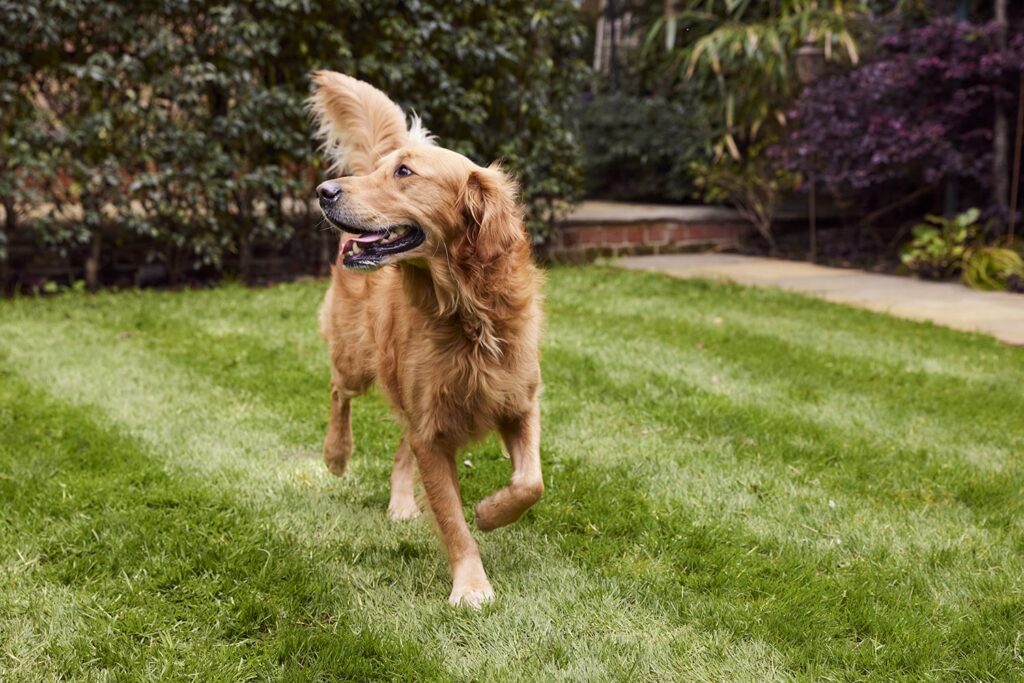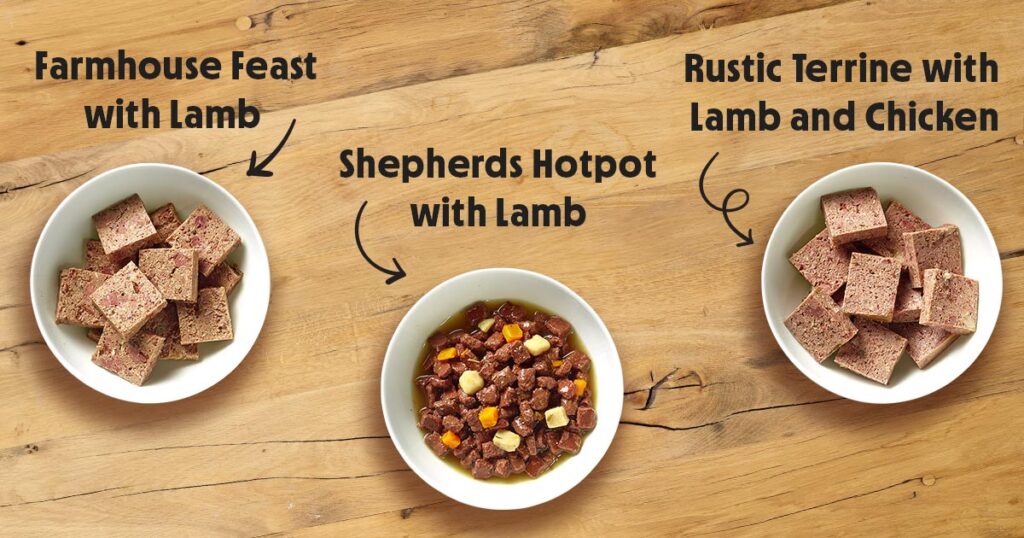
Dogs often love the taste of lamb, but how does it stack up against other protein sources in terms of health? In this article, we’ll explore the pros and cons of lamb in dog food, and give you the lowdown on this ingredient’s health benefits. We’ll also give you advice on how to feed it to your pup.
Key takeaways
- Lamb is nutritious and high in protein as well as important vitamins and minerals
- It can be a suitable protein source for dogs with allergies to other common proteins
- Fresh lamb is not suitable for every dog, as it can have a higher fat content
- Dogs shouldn’t be given cooked lamb bones to chew, or lamb that’s been spiced or seasoned for human consumption
Table of contents
Can dogs eat lamb?
Nutritional pros and cons of lamb for dogs
Is lamb good for dogs with allergies or sensitivities?
Can dogs be allergic to lamb?
Potential issues with feeding lamb to dogs
Lamb vs other dog food proteins
When to avoid lamb for dogs
Nutritionist-recommended takeaways
Can dogs eat lamb?
Yes, most dogs can eat lamb – it’s a safe and appropriate protein source for them. It can also be a great choice for fussy eaters who might enjoy the taste more than other meats. It’s a common ingredient in many commercial dog foods. At Tails.com, we use it in our range of wet food, as well as including it in some blends of our tailored kibble blends, too.
Lamb is often used in elimination diets for dogs with food sensitivities, who are allergic to other proteins like chicken.
If you’d like to give your dog lamb, there are a few things to bear in mind about how it should be prepared, to make sure it’s safe for your pet – we’ll get into this later in the article.
Nutritional pros and cons of lamb for dogs
Let’s get into some of the pros and cons of giving your dogs lamb.
High-quality protein source
Protein is essential for a happy, healthy dog, and like all meats, lamb is high in protein. A 3.5 ounce serving of lamb will typically contain 25 grams of protein.[1] It contains all 10 of the essential amino acids that dogs need in their diet, as does every kind of meat.
Rich in vitamins & minerals
Lamb contains plenty of healthy nutrients, like iron, zinc, selenium and vitamin B12. Lamb liver is especially high in B12, which has a number of health benefits for dogs, including improving their energy levels and protecting their immunity.[2] This vitamin has also been linked to brain function in dogs.[3] At Tails.com we use organ meats in our blends, meaning that dogs can get all the benefits of the vitamins and minerals from these cuts. Lamb is also a good source of iron, which has been linked to energy, and selenium, which reduces inflammation.[4] Finally, zinc also helps strengthen dogs’ immune systems.
Good fat content
We all know dogs need lots of energy for playtime and zoomies, and the fat content in lamb is a great source of energy. Grass-fed lamb is also rich in both Omega-3 and Omega-6 fatty acids, which help protect dogs’ skin and coats. It’s got a great balance between Omega-3 and Omega-6 too, another reason why it’s a healthy choice, as too much Omega-6 can lead to health problems.[5]
But while there are lots of good things about fat, like anything, it’s all about moderation. Some cuts of lamb (like neck, shoulder and flank) contain more fat than others, which is something to bear in mind when feeding your dog fresh lamb. In our Tails.com wet food recipes and tailored kibble blends, we choose the cuts carefully to control the fat content.
Lacks important amino acids
However, while lamb contains all the essential amino acids, it doesn’t have an optimum amino acid profile like chicken does. In particular, lamb is lower than other meats in taurine, which dogs need to keep their heart, skin and brain healthy. This means that you might need to check to make sure your dog’s lamb diet contains enough taurine. Here at Tails.com, all our blends contain all the amino acids needed for a balanced diet.
Is lamb good for dogs with allergies or sensitivities?
Lamb has a history of being used as a ‘novel protein’ in hypoallergenic diets for dogs with food sensitivities to more common proteins like chicken or beef. This is because, as a meat the dog is less likely to have tried before, it’s less likely to cause a reaction. Dogs who are allergic to more common proteins like beef or chicken are often able to tolerate lamb.
If you are looking to switch your dog to a different diet because of allergies or food sensitivities, we’d recommend talking to your vet first, or our nutrition specialists here at Tails.com.

Can dogs be allergic to lamb?
[10] It’s worth bearing in mind that food allergies in dogs can develop over time in response to overexposure to an ingredient. So it’s possible that dogs who are given a lamb-based diet because of their food sensitivity could also develop an allergy to lamb.[6]
Potential issues with feeding lamb to dogs
While lamb can be a great addition to your dog’s diet, there are a few things to bear in mind.
Fat content and pancreatitis
Fatty foods can increase the risk of pancreatitis in dogs, and lamb is a meat that can be high in fat – especially cuts like flank, neck and shoulder. It’s especially important that pets that have already had this condition once have a lower-fat diet, as two thirds of pancreatitis cases in dogs are chronic, meaning they are at risk of getting it again.
At Tails.com, we can cater for dogs that need a low fat diet, putting together a tailored kibble blend that’s balanced for their needs. We always choose the cuts of meat we use very carefully to make sure the fat balance is healthy in all our food.
Raw lamb considerations
Most nutritionists and vets don’t recommend feeding your dog a raw meat diet. Raw lamb is more likely to contain parasites and bacteria that would usually be killed during the cooking process [7], with both health and hygiene risks for both you and your pet.
It’s safer to buy high-quality raw pet food than meat from the supermarket. That’s because meat that’s intended for human consumption needs to be cooked first in order to kill off any bacteria, but commercially prepared pet food has to meet very high standards.
If you do choose to give your dog raw meat, speak to your vet first, and remember to be very careful about food hygiene in your kitchen, to keep you and your pet safe.
Seasonings and bones
Never feed your dog lamb that’s been seasoned or spiced, especially with onion or garlic, as while these ingredients are delicious to us, they’re toxic for dogs.[8] Some herbs like parsley and rosemary are safe for dogs in moderation, but in general, it’s best to avoid giving your dog leftovers that have been seasoned during cooking.[9]
When it comes to the dangers of cooked lamb, dogs should never eat or chew on cooked bones.[10] The cooking process makes them more likely to splinter into sharp pieces that could hurt your dog’s mouth or even give them an internal injury if they swallow them.
How to safely feed lamb to your dog
Here are some tips on the best ways to give your dog lamb, keeping your pet’s health and wellbeing in mind.
Best cooking methods
Lamb should be cooked without any seasoning or oil to make sure it’s safe for your pup. The best cooking methods include boiling, baking or grilling, as these methods don’t require added oil – oil can make meat too fatty for dogs.
As well as preparing lamb for your dog at home, you can opt for commercially prepared dog food that includes lamb cooked in these ways.
Appropriate portion sizes
The right amount of lamb to give your dog will vary based on a few different factors, including the size and age of your pup. The best thing to do is ask your vet if you aren’t sure. If you buy dog food for your pet rather than cooking their meals from scratch, it will come with advice on the best amount to feed them. At Tails.com, our 100% tailored kibble comes in a blend made especially for your dog, so that every portion is the perfect size and the right balance of nutrients.
Commercial lamb-based dog foods
You can find lamb in lots of commercially prepared foods, both wet and dry.
Our wet food range includes Farmhouse Feast with Lamb, Chicken & Green Beans; Shepherd’s Hotpot with Lamb, Vegetables and Rosemary; and Rustic Terrine with Lamb and Turkey. If you order our kibble, you might find that the blend we tailor especially for your dog contains lamb, depending on your dog’s individual needs and taste preferences.
All of these recipes contain lamb and other protein sources. If you’re looking for a lamb only diet, please contact our nutrition specialists.

Lamb vs other dog food proteins
Lamb has a number of advantages over other protein sources often given to dogs. It’s less likely than chicken or beef to cause an allergic reaction – other proteins that might be suitable for dogs with allergies include fish or turkey, as these are also often considered ‘novel proteins’.
On the other hand, certain cuts of lamb can be high in fat, and it’s a similar case with beef. Chicken, fish and turkey are much more likely to be low in fat, with the exception of some parts, like the skin.
| Protein | Lamb | Chicken | Fish | Beef |
| Common allergy | No | Yes | No | Yes |
| Fat content | Can be high | Low | Low | Can be high |
When to avoid lamb for dogs
To recap, there are a couple of reasons you might prefer to give your dog a different protein source other than fresh lamb:
- If your dog has had pancreatitis in the past or is sensitive to fat and gets an upset stomach
- If your dog is on a strict diet to manage their weight
If you are wondering whether to include lamb in your dog’s diet or whether it’s better to avoid it, you can always ask your vet, who will be able to give you a personal recommendation based on your dog’s health needs. If you’re with Tails.com, you can also reach out to our in-house nutrition specialists any time – we’ll be happy to help talk you through the best ingredients for your pup.
Nutritionist recommended takeaways
We recommend lamb as a suitable addition to your dog’s diet in general, because it’s a very nutritious protein that suits plenty of pups.
It might be especially useful if your dog is on an elimination diet to help understand or manage their allergies – or if you already know that your dog can’t have chicken, beef or another protein that they’re sensitive to.
Some people choose to feed their dog a rotation diet, varying key ingredients and types of food day-to-day, for their dog’s enjoyment as well as their health.[11] Adding lamb is a great way to mix up their diet with another healthy protein source!
It’s not ideal for every dog, so ask your vet for advice that’s tailored to you and your pet, especially if your dog has a health condition that means they need to limit their fat intake.
Lastly, cooked lamb is safer than raw lamb – but make sure you don’t let your dog eat cooked lamb bones, as this can be very dangerous for dogs.
Conclusion
We hope our article about whether lamb is good for dogs has been a handy guide. Overall, lamb is often a great addition to most dogs’ diet. It’s rich in protein as well as vitamins and minerals, and it can help dogs that have food sensitivities. But like any food, there might be reasons why it’s not suitable for your pet, so introduce it thoughtfully and speak to your vet if you have any questions.
Wondering what’s best to give your dog? Why not fill in our dog food quiz today? We’ll ask how old your dog is, as well as their breed, weight and activity level, to work out their unique nutritional needs and tailor a kibble blend especially for them.
FAQs
Can puppies eat lamb?
Yes, puppies who are old enough to eat solid food can eat lamb – whether that’s a commercial dog food or a small amount of lamb that’s been cooked at home in a dog-friendly way, without seasonings or oil.
Is duck or lamb better for dogs with allergies?
Like lamb, duck is considered a ‘novel protein’.[12] This means that dogs are less likely to have developed an allergic reaction to duck than chicken or other common proteins.
Can dogs eat lamb bones?
Our Head Vet Dr. Sean McCormack does not recommend giving dogs bones, cooked or uncooked. They can block your dog’s stomach, or can splinter into sharp pieces.
Can dogs eat lamb liver?
Yes, a small amount of lamb liver is very healthy for dogs. Liver is rich in protein, iron, potassium, phosphorus, copper and vitamins A, B and C. Like other meats, it should be cooked first.[13]
Sources
[1] Dogcancer.com, “Lamb for Dogs,” May 26, 2025
[2] TotalVet.com, “Vitamin B12 for Dogs: What You Need to Know”
[3] Dogcancer.com, “Lamb for Dogs,” May 26, 2025
[4] PetMD.com, “Dog Nutrition: Guide to Dog Food Nutrients,” June 17, 2025
[5] Unsustainable Magazine, “Lamb as a Novel Protein,” March 15, 2025
[6] VCA Hospitals, “Food Allergies in Dogs” 2022
[7] PDSA, “Feeding Your Pet a Raw Diet”
[8] PDSA, “Onion and Garlic Poisoning in Dogs”
[9] American Kennel Club, “Can Dogs Eat Parsley,” May 7, 2024
[10] Animal Emergency Services, “Cooked Bones are Dangerous to Dogs,” September 6, 2020
[11] Pets4home.com, “Rotating Feeding for Dogs”
[12] Denver Vet, “Best Food for Dogs with Allergies”
[13] Dogcancer.com, “Liver for Dogs,” November 29, 2023

What if my dog won’t eat it? She is very finicky and I’ve tried rabbit too. She’s on lamb food but still has reflux.
Please email us at hello@tails.com so we can help!